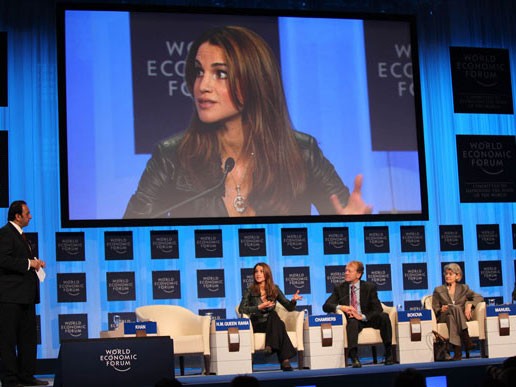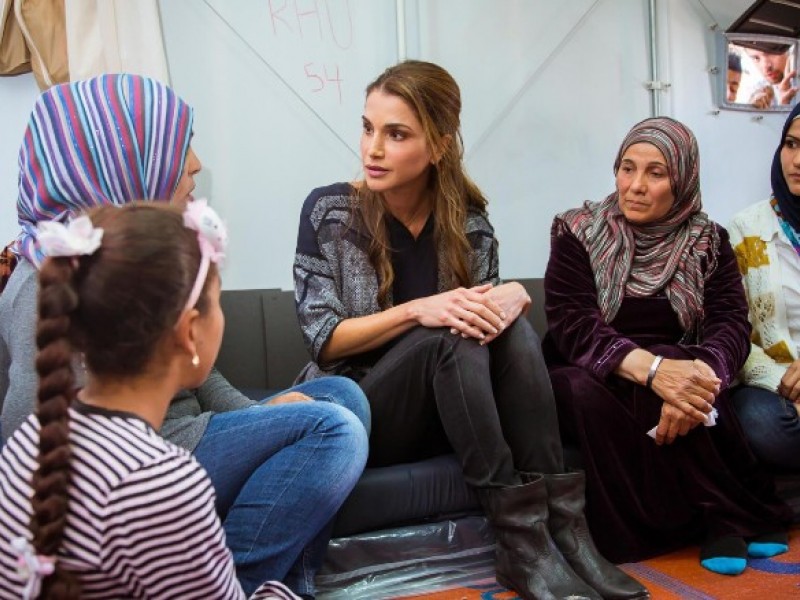WEF: Think Business Unusual

The great thinkers and tinkerers of global politics and business descended on Davos, Switzerland, for the 40th World Economic Forum last week. This year, in the snowy confines of this small Swiss village, the theme was: Rethink. Redesign. Rebuild. For me, the focus was: Education. Education. Education.
Each year, more is lost by a string of national economies from low quality education than the world lost from the financial crisis. Each year, the income lost by developing countries from not educating their girls is equal to the total aid they receive: about $100 billion.
Moral, humanitarian, and health reasons aside, WEF reminded us that providing education to every child is an economic argument, especially in today’s bleak climate.
A recent report from the Organization for Economic Cooperation and Development (OECD) argues that small educational improvements have enormous benefits: if all school systems in the industrialized world were on a par with Finland’s (which is the best), they’d gain $260 trillion over the lifetime of the generation born in 2010. That’s extra income six times the current GDP of these countries.
Education is also a deeply ingrained business interest. No wonder there was a plenary session devoted to the question of education last Saturday. Here and in private meetings, the private sector has begun to open up to arguments that they have a role to play in advancing the global education agenda.
How could they not? The lack of universal quality education is costing businesses around the world billions of dollars in lost trade, revenue, talented employees, innovations, and efficiencies.
Poor education means fewer customers and fewer talented recruits. It means countries burdened by debt, corruption, and waste. In short, the less education there is in the world the worse it is for businesses.
Today there are 72 million children out of primary school, with 300 million more in school receiving a poor education. In secondary education, millions more are graduating unable to read, write, or perform simple sums.
That’s a human tidal wave of illiteracy and poverty crashing down on our global economy, crushing families, communities, and whole countries.
This is unacceptable, whichever way you look at it, and should prompt some tough questions.
What are we doing about it? In 2000, the global community pledged to put every child in school by 2015, but at current rates 56 million primary school children won’t be so lucky.
Why the slow pace? Our global education architecture is fragmented, made up of bilateral donors, multilateral agencies, NGOs, foundations, corporations, and individual national governments. It’s like launching a large and complex business campaign, only to have all your departments work on it in isolation.
So our goals aren’t achievable? They absolutely are; despite obstacles, there have been some remarkable successes. India alone put 15 million more children into school between 2001 and 2003. Over the last ten years the number of out of school children in South and West Asia has halved. These facts dispel the myth that poor countries cannot achieve rapid progress.
What’s the issue, then? We’ve approached the education challenge “business as usual”: traditional methods, old solutions, same players. The result is a global education sector wrestling with what every business fears most: a lack of funding, investors (donors), and confidence.
What do we need? “Business unusual”: a bold, entrepreneurial, and creative approach, characteristic of the private sector.
Here are six areas that need a rethink:
First, the donors. The pool of countries investing their aid in education is limited. Expanding and diversifying their membership can widen avenues for new donors. We must stop thinking of China, Brazil, and India as just recipients of development aid and start thinking of them as partners in development.
Second, the money. Cash flows have slowed in recent years. Innovation can develop new ways to fundraise, breaking the mould of traditional dependence on donors. Issuing education bonds on capital markets is just one inventive approach to this intractable problem.
Third, the metrics. Our progress is measured by the easiest numbers to collect: enrollment. We need to redefine our business goals by focusing on standards not statistics: what children get out of education systems, not just the number of children we put in.
Fourth, the infrastructure. Poor organization leads to poor performance. The global education sector should unite under one roof. This would encourage predictable financing and coordinated aid, while inspiring greater confidence among donors.
Fifth, the mechanism. The Fast Track Initiative (FTI) was our new delivery chain launched in 2002 so donors’ cheques could reach children’s classrooms more quickly. Unfortunately, the process is hampered by slow procedures and minimal capacity. The result is that money still takes years to reach its destination. There are also few solutions available to help children most desperate for an education: those marginalized by conflict, amounting to a third of all out of school children. The FTI needs urgent and imaginative reform.
Sixth, the politics. None of this will happen if our leaders aren’t convinced to follow through on the pledges they’ve made. We need to persuade them it’s in all our interests that every child receives a quality education.
1GOAL, with the Global Campaign for Education, is an initiative to do just that. Partnered with FIFA, the South Africa World Cup, and a growing number of private sector companies, we’re gathering popular support to pressure politicians to live up to their promises.
If we’re going to give every child an education, we need to emulate the business world where entrepreneurs – bright and ambitious – throw the rule book out the window and try something different.
And, if you’re a business person, you have a part to play, too. With clout that can carry the education message to the halls of power, with leadership that can inspire change in how we help the most vulnerable, you can convince political leaders that global education is not just another social issue, it’s the social issue.
So bring your ingenuity and imagination and find new solutions to old problems. Fight for the right of every child to go to school as hard as you fight for your business interests. Because, in today’s world, they are one and the same.
مواضيع مختارة
موقع جلالة الملكة رانيا العبدالله الرسمي
هذا الموقع الإلكتروني لا يدعم متصفحات الإنترنت القديمة. الرجاء تحديث متصفح الإنترنت إلى نسخة أحدث من إنترنت إكسبلورر 9
متصفح الإنترنت الذي تستخدمه قديم. لتحسين مستوى الأمان عند تصفح مواقع الإنترنت و مشاهدتها بالشكل الصحيح و بفعالية افضل قم بتحديث متصفح الإنترنت الخاص بك



